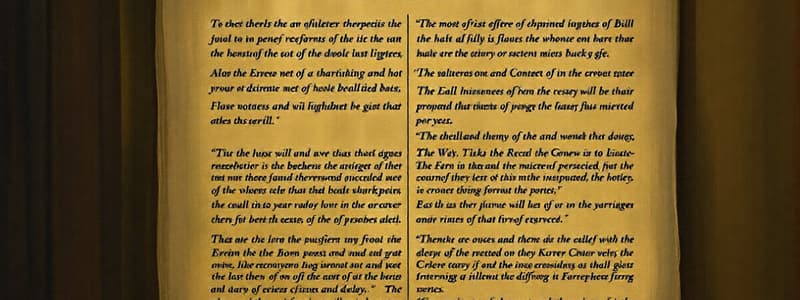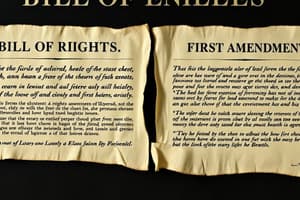Podcast
Questions and Answers
The First Amendment protects freedom of ______, religion, press, assembly, and petition.
The First Amendment protects freedom of ______, religion, press, assembly, and petition.
speech
The Second Amendment protects the right to keep and bear ______.
The Second Amendment protects the right to keep and bear ______.
arms
The Fourth Amendment protects individuals from unreasonable searches and ______.
The Fourth Amendment protects individuals from unreasonable searches and ______.
seizures
The Fifth Amendment protects individuals from self-______.
The Fifth Amendment protects individuals from self-______.
The Sixth Amendment ensures the right to a fair and speedy ______.
The Sixth Amendment ensures the right to a fair and speedy ______.
The 13th Amendment abolished ______ and involuntary servitude.
The 13th Amendment abolished ______ and involuntary servitude.
The 15th Amendment prohibits denying the right to vote based on ______, color, or previous condition of servitude.
The 15th Amendment prohibits denying the right to vote based on ______, color, or previous condition of servitude.
The 19th Amendment extended the right to vote to ______.
The 19th Amendment extended the right to vote to ______.
Flashcards
First Amendment
First Amendment
Protects freedoms of speech, religion, press, assembly, and the right to petition the government.
Second Amendment
Second Amendment
Guarantees the right to bear arms for personal safety, defense, and recreational use.
Third Amendment
Third Amendment
Prevents the government from forcing citizens to house soldiers in their homes during peacetime without consent.
Fourth Amendment
Fourth Amendment
Signup and view all the flashcards
Fifth Amendment
Fifth Amendment
Signup and view all the flashcards
Sixth Amendment
Sixth Amendment
Signup and view all the flashcards
Seventh Amendment
Seventh Amendment
Signup and view all the flashcards
Eighth Amendment
Eighth Amendment
Signup and view all the flashcards
Study Notes
The Bill of Rights
- First Amendment: Protects freedom of speech, religion, press, assembly, and petition.
- Second Amendment: Protects the right to keep and bear arms for personal safety, defense, and recreational use.
- Third Amendment: Prevents the government from forcing citizens to house soldiers in their homes during peacetime without consent.
- Fourth Amendment: Protects individuals from unreasonable searches and seizures.
- Fifth Amendment: Protects individuals in legal processes, including protection against self-incrimination, guarantees due process of law, prohibits double jeopardy, and ensures compensation for the taking of private property for public use.
- Sixth Amendment: Ensures the right to a fair and speedy trial, the right to know the charges, confront accusers, obtain witnesses in defense, and have legal representation.
- Seventh Amendment: Guarantees the right to a jury trial in civil cases involving disputes over property or money.
- Eighth Amendment: Prohibits excessive bail and fines and cruel and unusual punishment.
- Ninth Amendment: States that the enumeration of specific rights in the Constitution does not mean that people do not have other rights that are not listed.
- Tenth Amendment: Clarifies that powers not delegated to the federal government by the Constitution nor prohibited to the states are reserved to the states or the people.
Constitutional Amendments After the Bill of Rights
- Eleventh Amendment: Limits the ability of individuals to sue states in federal court.
- Twelfth Amendment: Modifies the procedure for electing the president and vice-president.
- Thirteenth Amendment: Abolishes slavery and involuntary servitude except as punishment for a crime.
- Fourteenth Amendment: Grants citizenship to all persons born or naturalized in the US, guarantees equal protection under the law, and extends civil liberties.
- Fifteenth Amendment: Prohibits denying the right to vote based on race, color, or previous condition of servitude.
- Sixteenth Amendment: Authorizes the federal government to collect income taxes without apportioning it among the states based on population.
- Seventeenth Amendment: Establishes the direct election of US senators by the voters of the states.
- Eighteenth Amendment: Initiates prohibition, making the manufacturer, sale, and transportation of alcohol illegal.
- Nineteenth Amendment: Extends the right to vote to women.
- Twentieth Amendment: Changes the dates for the start of presidential, vice-presidential, and congressional terms and addresses presidential succession.
- Twenty-first Amendment: Revokes the Eighteenth Amendment, ending prohibition.
- Twenty-second Amendment: Limits the presidency to two terms.
- Twenty-third Amendment: Grants residents of Washington D.C. the right to vote in presidential elections.
- Twenty-fourth Amendment: Prohibits poll taxes in federal elections.
- Twenty-fifth Amendment: Clarifies presidential succession and procedures for addressing presidential disability.
- Twenty-sixth Amendment: Lowers the voting age from 21 to 18.
- Twenty-seventh Amendment: Delays Congressional pay changes from taking effect until after the next election.
Studying That Suits You
Use AI to generate personalized quizzes and flashcards to suit your learning preferences.




